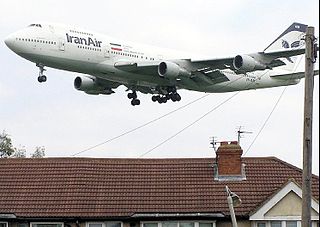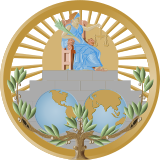
Legality of the Threat or Use of Nuclear Weapons [1996] ICJ 2 is a landmark international law case, where the International Court of Justice gave an advisory opinion stating that there is no source of law, customary or treaty, that explicitly prohibits the possession or even use of nuclear weapons. The only requirement being that their use must be in conformity with the law on self-defence and principles of international humanitarian law.

Mohammad Javad Zarif is an Iranian career diplomat and academic. He has been foreign minister of Iran since 2013.

Stephen Myron Schwebel, is an American jurist, counsel and independent arbitrator. He serves as Judge of the World Bank Administrative Tribunal and as a member of the U.S. national group at the Permanent Court of Arbitration. Previously, he served as President of the World Bank Administrative Tribunal, as President of the International Monetary Fund Administrative Tribunal (1993–2010), as President of the International Court of Justice (1997–2000), as Vice President of the International Court of Justice (1994–1997) and as Judge of the International Court of Justice (1981–2000). Prior to his tenure on the World Court, Judge Schwebel served as Deputy Legal Adviser to the U.S. Department of State (1974–1981) and as Assistant Legal Adviser to the U.S. Dept. of State (1961–1967). He also served as a professor of law at Harvard Law School (1959–1961) and Johns Hopkins University (1967–1981). Judge Schwebel is noted for his expansive opinions in momentous cases such as Legality of the Threat or Use of Nuclear Weapons, Military and Paramilitary Activities in and Against Nicaragua and Oil Platforms .

International law, also known as public international law or law of nations, is the set of rules, norms, and standards generally regarded and accepted in relations between nations. It establishes normative guidelines and a common conceptual framework for states to follow across a broad range of domains, including war, diplomacy, human rights, and commerce. International law thus provides a mean for states to practice more stable, consistent, and organized international relations.

The United States applies economic, trade, scientific and military sanctions against Iran. U.S. economic sanctions are administered by the U.S. Office of Foreign Assets Control. Currently, the U.S. sanctions against Iran include an embargo on dealings with the country by the U.S., and a ban on selling aircraft and repair parts to Iranian aviation companies.
Oil Platforms case is a public international law case decided by the International Court of Justice in 2003.
A prisoner exchange or prisoner swap is a deal between opposing sides in a conflict to release prisoners: prisoners of war, spies, hostages, etc. Sometimes, dead bodies are involved in an exchange.

Mark D. Wallace is an American businessman, former diplomat and lawyer who has served in a variety of government, political and private sector posts. He served in several positions during the administration of President George W. Bush, including as the United States Ambassador to the United Nations for UN Management and Reform.

United Nations Security Council Resolution 1929, adopted on 9 June 2010, after recalling resolutions 1696 (2006), 1737 (2006), 1747 (2007), 1803 (2008), 1835 (2008) and 1887 (2009) concerning the topics of Iran and non-proliferation, the Council noted that Iran had failed to comply with previous Security Council resolutions concerning its nuclear program and imposed further sanctions on the country.

Australia–Iran relations refer to bilateral relations between Australia and Iran. Australia has maintained a continuous diplomatic presence in Iran since the Australian Embassy in Tehran was established in 1968. Iran has had an embassy in Canberra since 1971.

The Iran nuclear deal framework was a preliminary framework agreement reached in 2015 between the Islamic Republic of Iran and a group of world powers: the P5+1 and the European Union.

This article discusses the negotiations between the P5+1 and Iran that led to the Joint Comprehensive Plan of Action.
Bank Markazi v. Peterson, 578 U.S. ___ (2016), was a United States Supreme Court case that found that a law which only applied to a specific case, identified by docket number, and eliminated all of the defenses one party had raised does not violate the separation of powers in the United States Constitution between the legislative (Congress) and judicial branches of government. The plaintiffs in the trial court, respondents in the Supreme Court, were several parties who had obtained judgments against Iran for its role in supporting state-sponsored terrorism, particularly the 1983 Beirut barracks bombings and 1996 Khobar Towers bombing, and sought execution against a bank account in New York held, through European intermediaries, on behalf of Bank Markazi, the state-owned Central Bank of Iran. The initial plaintiffs obtained court orders preventing the transfer of funds from the account in 2008 and initiated their lawsuit in 2010. Bank Markazi raised several defenses against the execution against the account, including that the account was not an asset of the bank, but rather an asset of its European intermediary, under both New York state property law and §201(a) of the Terrorism Risk Insurance Act. In response to concerns that existing laws were insufficient for the account to be used to settle the judgments, Congress included a section within a 2012 bill, codified after enactment as 22 U.S.C. § 8772, that identified the pending lawsuit by docket number, applied only to the assets in the identified case, and essentially abrogated every legal basis available to Bank Markazi to prevent the plaintiffs from executing their claims against the account. Bank Markazi then argued that § 8772 was an unconstitutional breach of the separation of power between the legislative and judicial branches of government, because it effectively directed a particular result in a single case without changing the generally applicable law. The United States District Court for the Southern District of New York and, on appeal, the United States Court of Appeals for the Second Circuit both upheld the constitutionality of § 8772 and cleared the way for the plaintiffs to execute their judgments against the account, which held about $1.75 billion in cash.
Iranian frozen assets in international accounts are calculated to be worth between $100 billion and $120 billion. Almost $1.973 billion of Iran's assets are frozen in the United States. According to the Congressional Research Service, in addition to the money locked up in foreign bank accounts, Iran's frozen assets include real estate and other property. The estimated value of Iran's real estate in the U.S. and their accumulated rent is $50 million. Besides the assets frozen in the U.S., some parts of Iran's assets are frozen around the world by the United Nations.

Jennifer Gillian Newstead is an American attorney who currently serves as the General Counsel at Facebook.

The Joint Comprehensive Plan of Action, commonly known as the Iran nuclear deal or Iran deal, is an agreement on the Iranian nuclear program reached in Vienna on 14 July 2015 between Iran, the P5+1, and the European Union.

Iranian Foreign Minister, Mohammad Javad Zarif has proposed Iran's prisoner swap proposal or prisoner exchange to United States government in October 2018. This proposal has remained without any answer from U.S. side until today, Zarif said to CBS News. Zarif, spoke about prisoner exchange between Iran and U.S. during an interview with CBS News agency, and added that the U.S. government must prove that its seriousness before any negotiations.


















